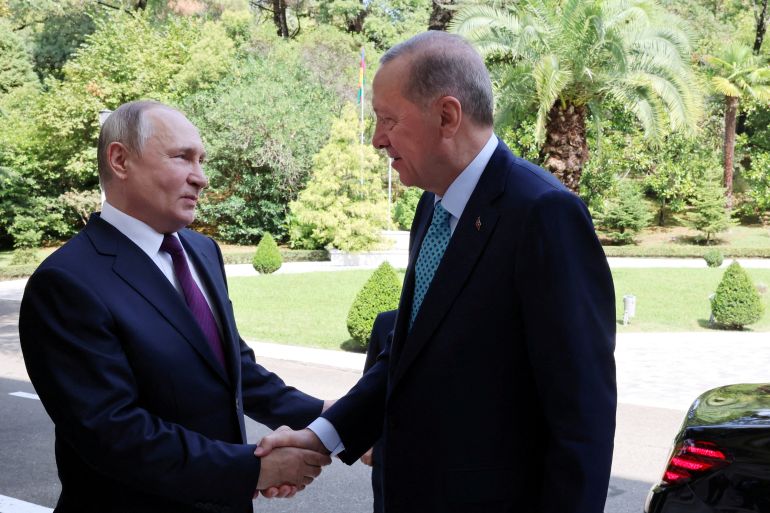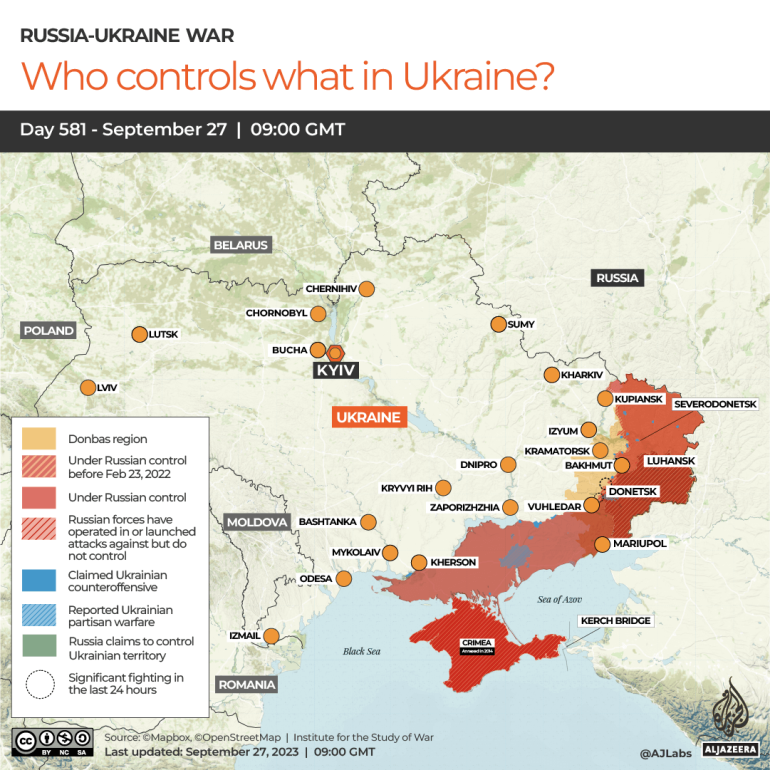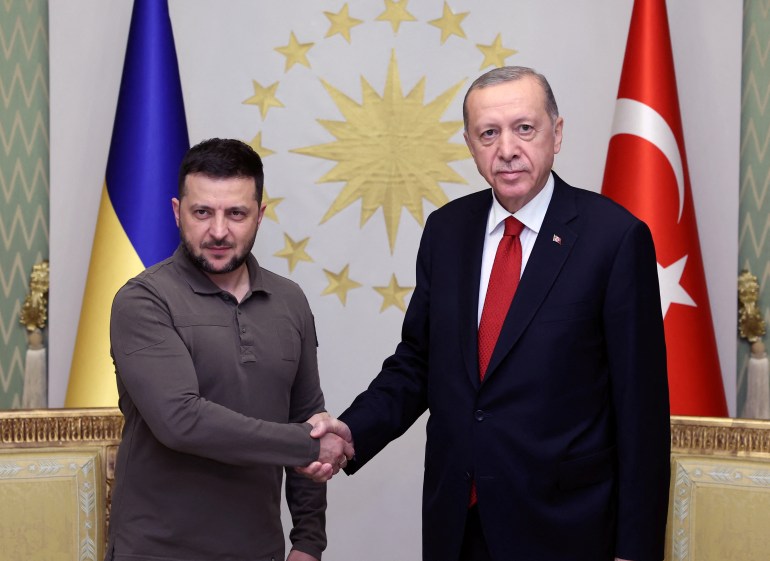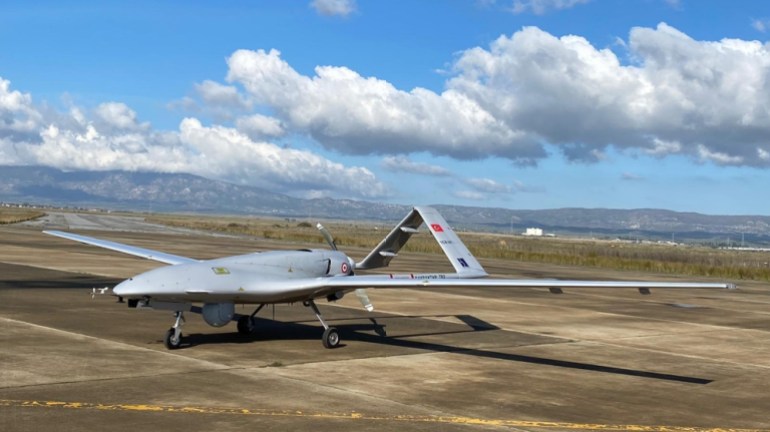Turkish neutrality: How Erdogan manages ties with Russia, Ukraine amid war
‘The West is reliable, Russia is equally reliable,’ the Turkish president said in a recent interview, a comment that reflects his delicate balancing act.

Kyiv, Ukraine – In Recep Tayyip Erdogan’s opinion, Russia and the West are “equally” reliable and trustworthy.
That is what the Turkish president said on September 18 commenting on the collective West’s dependability and on his frustration with Turkey’s long-stalled attempts to join the European Union.
Keep reading
list of 4 itemsAnalysis: Is Turkey’s bid for EU membership over?
Turkey supports ‘steps taken by Azerbaijan’ in Nagorno-Karabakh: Erdogan
What’s it like going back to school in Turkey’s earthquake zone?
“To the extent the West is reliable, Russia is equally reliable,” he told the PBS, a US broadcaster. “For the last 50 years, we have been waiting at the doorstep of the EU, and, at this moment in time, I trust Russia just as much as I trust the West.”
After his September 4 visit to Russia to meet President Vladimir Putin, Erdogan also believes the Kremlin’s master wants a prompt end to his faltering quagmire in Ukraine.
“Mr Putin is on the side of ending this war as soon as possible. That’s what he said. And I believe his remarks,” Erdogan said.
Erdogan may appear to sound naive, but he is directing a careful balancing act between the warring sides, the West, China and his own domestic audience.

His equidistant position reaped enormous economic and political benefits both for him and his nation hobbled by a five years-long recession and traumatised by the February 6 earthquake that killed tens of thousands.
“Erdogan’s geopolitics is based on balancing on three points of geopolitical confrontation – the West, Russia, China,” Kyiv-based analyst Aleksey Kushch told Al Jazeera.
“From every direction, Erdogan gets maximal profit – markets, technologies and the economic modernisation from the West, cheap raw materials, fuel and a natural gas hub from Russia, transit [of goods] and investments from China,” he said.
To some Ukrainians, this balance may look cynical.
“He’s like a market trader – he smiles and asks about your family, but all he wants is your money and your recommendation to another buyer,” Valentin Aleksashenko, a Kyiv-based IT analyst who regularly holidays in Turkey, told Al Jazeera.
But Erdogan’s stance does help Kyiv’s war effort.

He calls Ukrainian President Volodymyr Zelenskyy a “dear friend”, recently gave him a red-carpet reception in Istanbul, and has helped negotiate the release of war prisoners and the extension of the “grain deal” to ship Ukrainian wheat via the Black Sea.
The Bayraktar attack drones produced by the company that belongs to Erdogan’s son-in-law proved to be so lethally effective against Russian troops that Ukrainians name radio stations, cell phone plans, and business lunch menus after them.
Erdogan’s reluctance to take sides works for him at home – especially since his voters realise how reluctant most EU member states are to let their nation in, and how Western “double standards” on migration spur anti-Western sentiments among them, said Seda Demiralp of Istanbul’s Isik University.
“His voters are convinced that an independent position benefits Turkish interests most. Turkish voters do appreciate closer ties with the West while at the same time realising Turkey is never treated as an equal partner by the West,” she told Al Jazeera.
“From Erdogan’s point of view, it’s perfectly rational to pursue policies that are not seen as exclusively supporting one party. He can neither alienate the West nor Russia,” Gonul Tol, a Turkish-born analyst with the Middle East Institute, a think tank in Washington, DC, told Al Jazeera.
On the other hand, Brussels, Washington and Moscow have no choice but to approach Erdogan time and again.
“From Western and Russian points of view, no matter how frustrated they get with Erdogan, they, too, think they must cooperate with Turkey,” Tol said.
And then there is a personal connection between Erdogan and Putin, whose political trajectories are somewhat similar. Both were born in the 1950s and have been in power for more than two decades pursuing what critics call increasingly authoritarian and nationalist policies, though Erdogan and his supporters deny this.
Both are nostalgic about their nations’ imperial heyday – and strive to revive it despite all odds. And both try to find common ground.
“Time has shown that both leaders follow their nations’ interests, but can agree and compromise at the same time,” said Emil Mustafayev, an analyst based in Baku, the capital of Azerbaijan, Turkey’s key ally in the former Soviet Union.
“And despite their myriad disagreements, it makes their relationship somewhat unique in today’s world,” he told Al Jazeera.

Both are rewriting the centuries-old history of very uneasy ties.
Russian czars and Ottoman sultans were at war a dozen times, and Czar Nicolas I famously called Turkey “Europe’s sick man” before the Crimean war that pitted Turkey and Western powers against Russia in the 1850s.
A century and a half later, Moscow looks like “Europe’s sick man” as its annexation of Crimea and the war in Ukraine prompted tensions between roughly the same players.
In 2015, during Russia’s campaign to rescue Syrian President Bashar al-Assad’s crumbling regime, Turkish air force downed a Russian fighter jet that Ankara claimed violated its air space.
The incident provoked tensions as Moscow imposed sanctions, banned charter flights to Turkey and ordered holiday companies to “evacuate” tens of thousands of tourists.
Gazprom, Russia’s natural gas exporter, suspended the construction of a 1,100-kilometers-long (683-mile) pipeline to Turkey.
But tensions soon ended, Russian gas was pumped to Turkey and farther to Eastern Europe, and Moscow even allowed Ankara to defer a $600m gas bill.
After the disruption of Nord Stream, a Russian natural gas pipeline to Germany, the Kremlin decided to create a “gas hub” in Turkey.
But the plan stalled because of something that could be emblematic of ties between Erdogan and Putin – the sides cannot agree on who is going to have more control over the hub, Reuters reported in mid-September.